Project Proposal: Ethics & Professionalism in Computing IMAT5262
VerifiedAdded on 2023/06/12
|25
|5122
|448
Project
AI Summary
This document is a research project proposal exploring the role of ethics in shaping the professional responsibilities of ICT professionals. It covers professional codes of ethics, responsibilities of professionals, consequences of not following ethical codes, and the influence of codes on the responsibilities of professionals. The literature review identifies a research gap concerning the unified view of the impacts of codes of ethics on professional conduct. The proposal suggests a qualitative research approach, involving 100 professionals, with data analysis using thematic analysis to achieve the research objectives. The proposal includes a background, research questions, literature review, methodology review, project plan, ethical review form, and consent form.
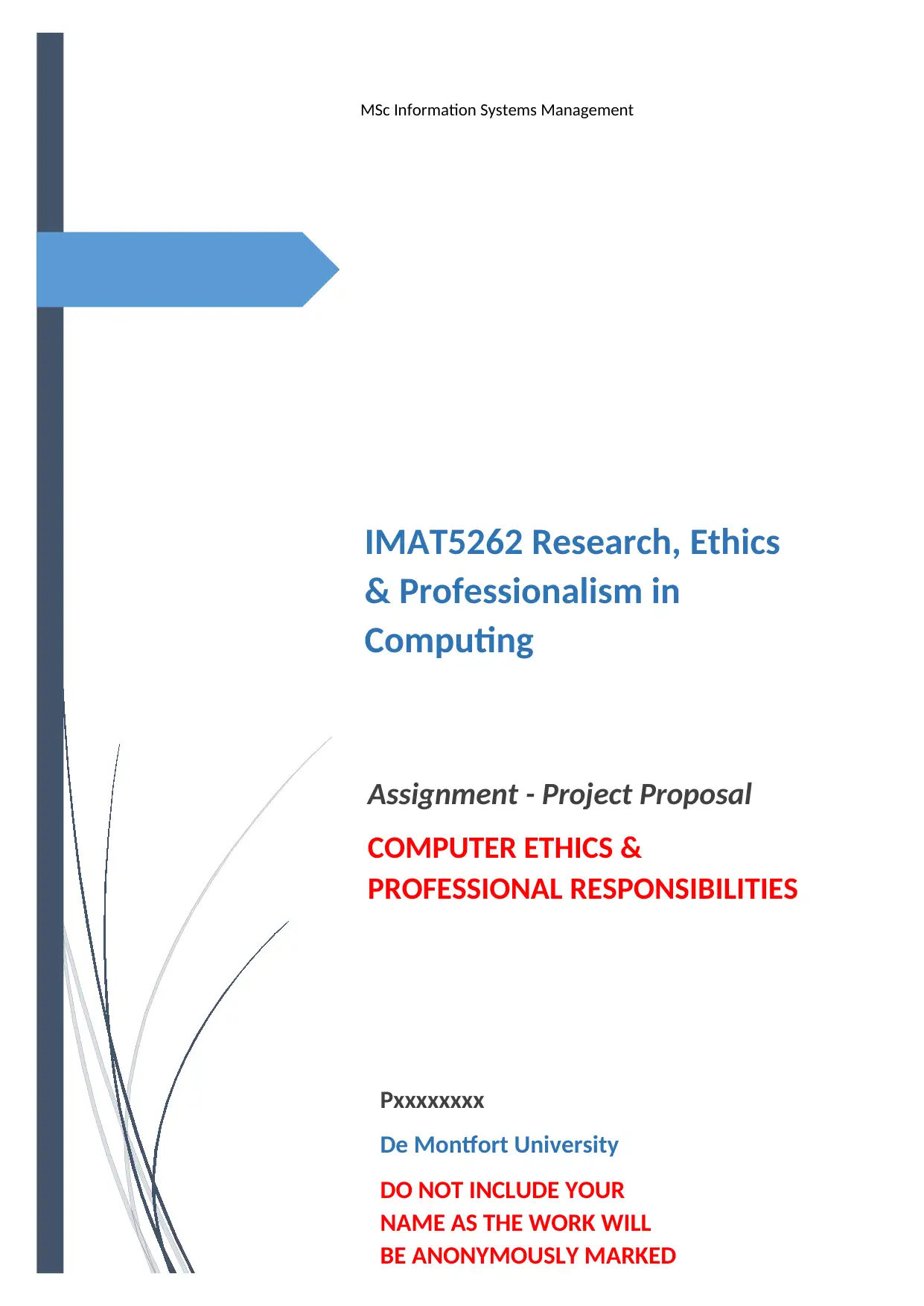
MSc Information Systems Management
IMAT5262 Research, Ethics
& Professionalism in
Computing
Assignment - Project Proposal
COMPUTER ETHICS &
PROFESSIONAL RESPONSIBILITIES
Pxxxxxxxx
De Montfort University
DO NOT INCLUDE YOUR
NAME AS THE WORK WILL
BE ANONYMOUSLY MARKED
IMAT5262 Research, Ethics
& Professionalism in
Computing
Assignment - Project Proposal
COMPUTER ETHICS &
PROFESSIONAL RESPONSIBILITIES
Pxxxxxxxx
De Montfort University
DO NOT INCLUDE YOUR
NAME AS THE WORK WILL
BE ANONYMOUSLY MARKED
Paraphrase This Document
Need a fresh take? Get an instant paraphrase of this document with our AI Paraphraser
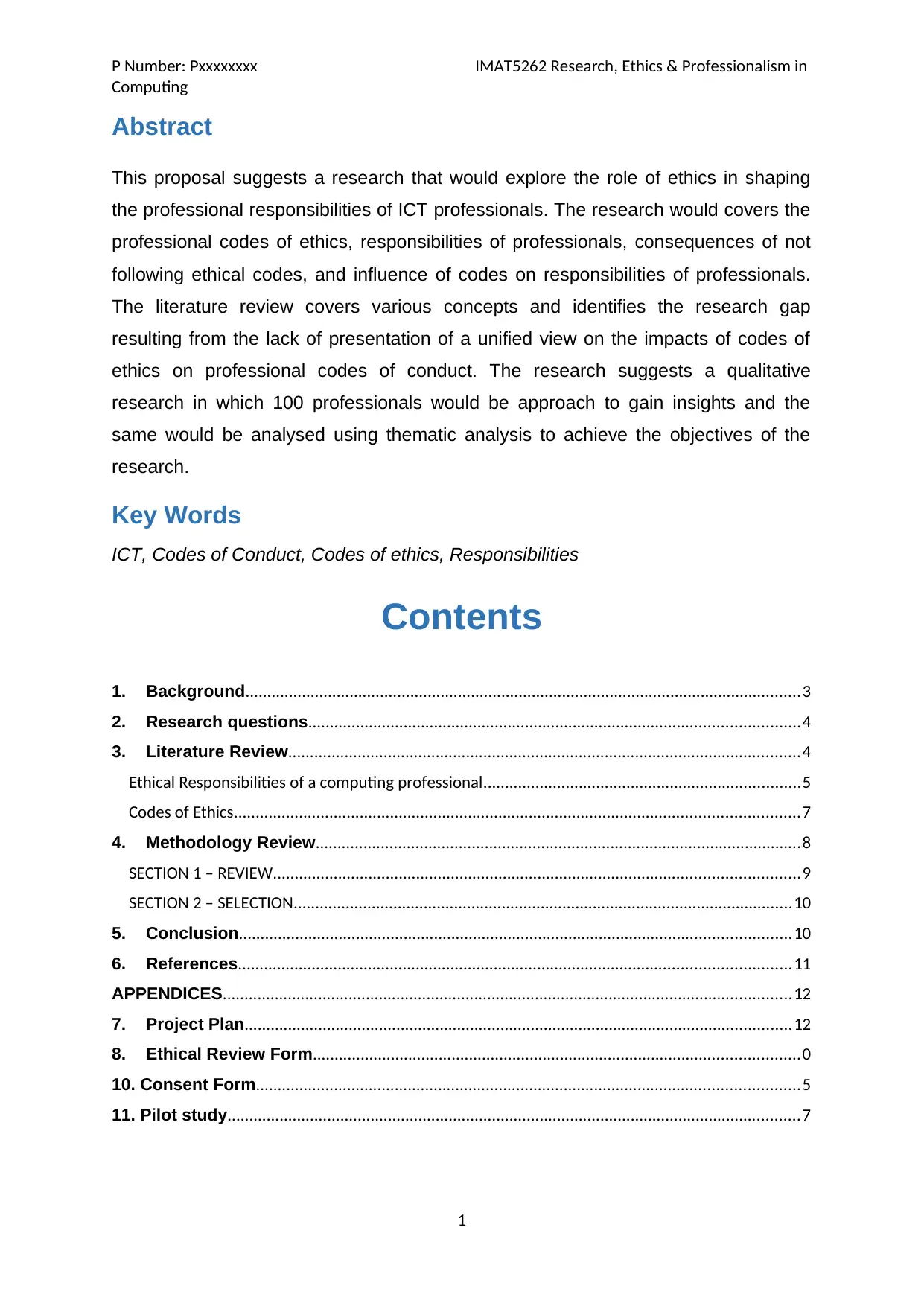
P Number: Pxxxxxxxx IMAT5262 Research, Ethics & Professionalism in
Computing
Abstract
This proposal suggests a research that would explore the role of ethics in shaping
the professional responsibilities of ICT professionals. The research would covers the
professional codes of ethics, responsibilities of professionals, consequences of not
following ethical codes, and influence of codes on responsibilities of professionals.
The literature review covers various concepts and identifies the research gap
resulting from the lack of presentation of a unified view on the impacts of codes of
ethics on professional codes of conduct. The research suggests a qualitative
research in which 100 professionals would be approach to gain insights and the
same would be analysed using thematic analysis to achieve the objectives of the
research.
Key Words
ICT, Codes of Conduct, Codes of ethics, Responsibilities
Contents
1. Background................................................................................................................................3
2. Research questions.................................................................................................................4
3. Literature Review......................................................................................................................4
Ethical Responsibilities of a computing professional.........................................................................5
Codes of Ethics..................................................................................................................................7
4. Methodology Review................................................................................................................8
SECTION 1 – REVIEW.........................................................................................................................9
SECTION 2 – SELECTION...................................................................................................................10
5. Conclusion...............................................................................................................................10
6. References...............................................................................................................................11
APPENDICES...................................................................................................................................12
7. Project Plan..............................................................................................................................12
8. Ethical Review Form................................................................................................................0
10. Consent Form.............................................................................................................................5
11. Pilot study....................................................................................................................................7
1
Computing
Abstract
This proposal suggests a research that would explore the role of ethics in shaping
the professional responsibilities of ICT professionals. The research would covers the
professional codes of ethics, responsibilities of professionals, consequences of not
following ethical codes, and influence of codes on responsibilities of professionals.
The literature review covers various concepts and identifies the research gap
resulting from the lack of presentation of a unified view on the impacts of codes of
ethics on professional codes of conduct. The research suggests a qualitative
research in which 100 professionals would be approach to gain insights and the
same would be analysed using thematic analysis to achieve the objectives of the
research.
Key Words
ICT, Codes of Conduct, Codes of ethics, Responsibilities
Contents
1. Background................................................................................................................................3
2. Research questions.................................................................................................................4
3. Literature Review......................................................................................................................4
Ethical Responsibilities of a computing professional.........................................................................5
Codes of Ethics..................................................................................................................................7
4. Methodology Review................................................................................................................8
SECTION 1 – REVIEW.........................................................................................................................9
SECTION 2 – SELECTION...................................................................................................................10
5. Conclusion...............................................................................................................................10
6. References...............................................................................................................................11
APPENDICES...................................................................................................................................12
7. Project Plan..............................................................................................................................12
8. Ethical Review Form................................................................................................................0
10. Consent Form.............................................................................................................................5
11. Pilot study....................................................................................................................................7
1
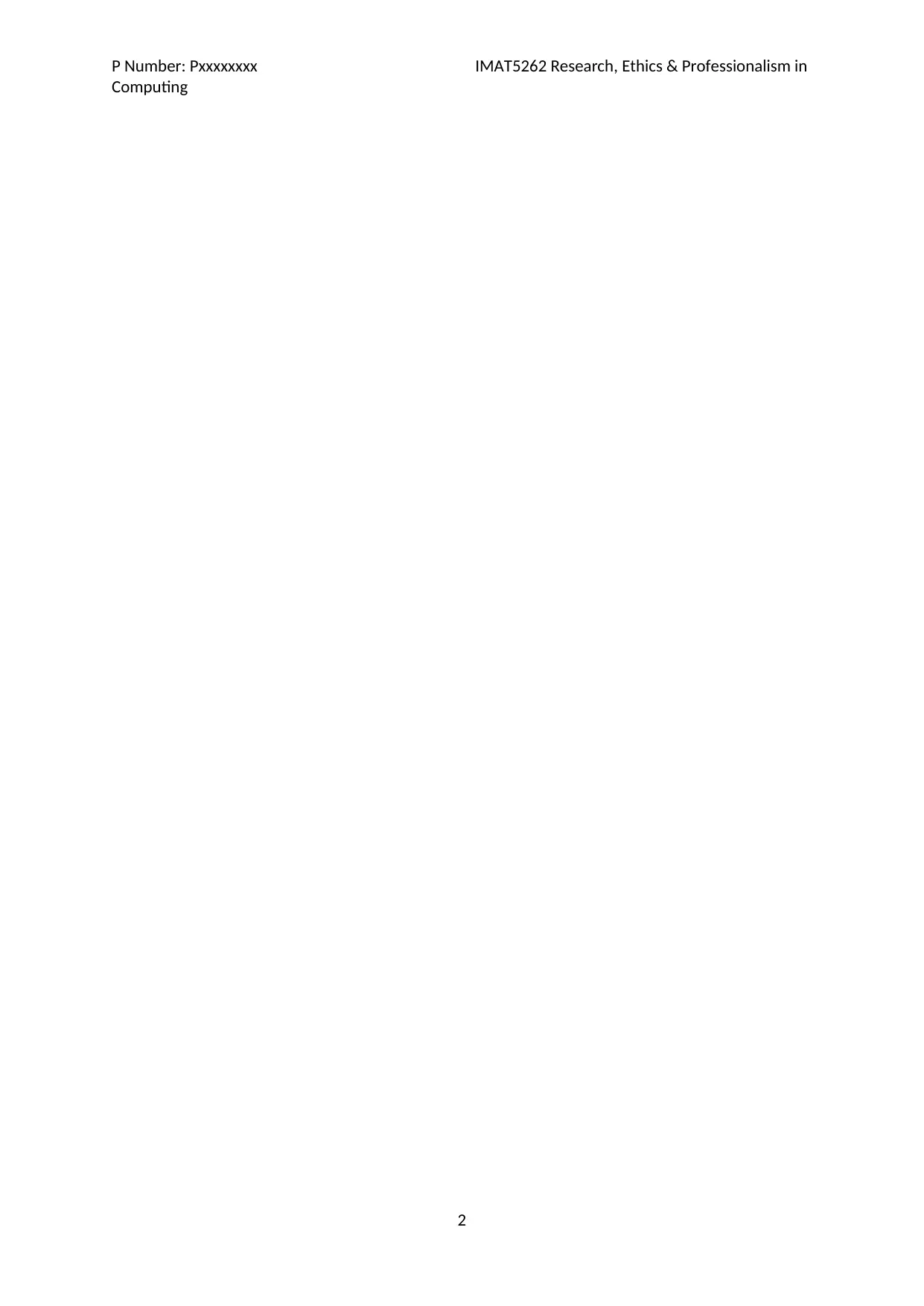
P Number: Pxxxxxxxx IMAT5262 Research, Ethics & Professionalism in
Computing
2
Computing
2
⊘ This is a preview!⊘
Do you want full access?
Subscribe today to unlock all pages.

Trusted by 1+ million students worldwide
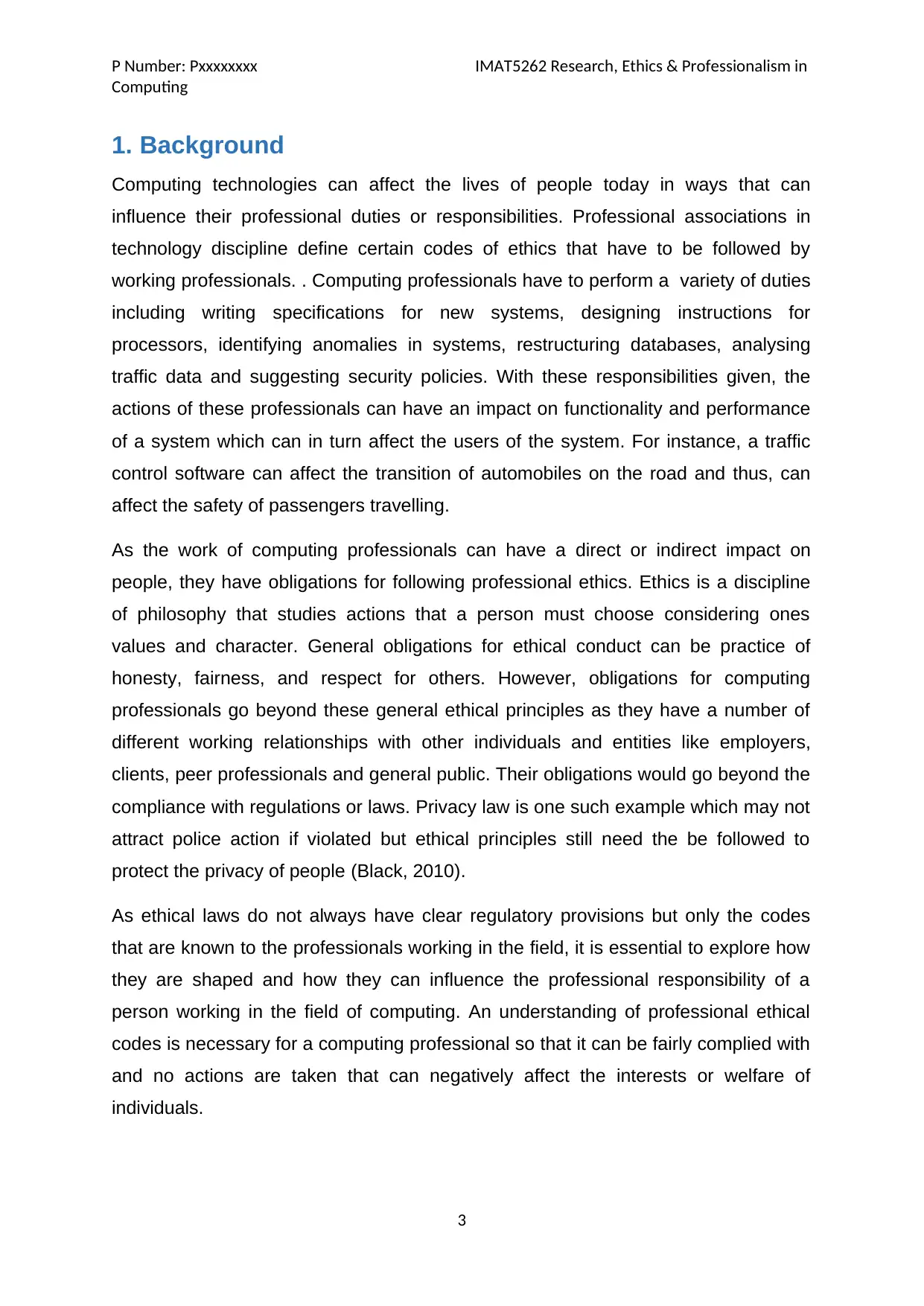
P Number: Pxxxxxxxx IMAT5262 Research, Ethics & Professionalism in
Computing
1. Background
Computing technologies can affect the lives of people today in ways that can
influence their professional duties or responsibilities. Professional associations in
technology discipline define certain codes of ethics that have to be followed by
working professionals. . Computing professionals have to perform a variety of duties
including writing specifications for new systems, designing instructions for
processors, identifying anomalies in systems, restructuring databases, analysing
traffic data and suggesting security policies. With these responsibilities given, the
actions of these professionals can have an impact on functionality and performance
of a system which can in turn affect the users of the system. For instance, a traffic
control software can affect the transition of automobiles on the road and thus, can
affect the safety of passengers travelling.
As the work of computing professionals can have a direct or indirect impact on
people, they have obligations for following professional ethics. Ethics is a discipline
of philosophy that studies actions that a person must choose considering ones
values and character. General obligations for ethical conduct can be practice of
honesty, fairness, and respect for others. However, obligations for computing
professionals go beyond these general ethical principles as they have a number of
different working relationships with other individuals and entities like employers,
clients, peer professionals and general public. Their obligations would go beyond the
compliance with regulations or laws. Privacy law is one such example which may not
attract police action if violated but ethical principles still need the be followed to
protect the privacy of people (Black, 2010).
As ethical laws do not always have clear regulatory provisions but only the codes
that are known to the professionals working in the field, it is essential to explore how
they are shaped and how they can influence the professional responsibility of a
person working in the field of computing. An understanding of professional ethical
codes is necessary for a computing professional so that it can be fairly complied with
and no actions are taken that can negatively affect the interests or welfare of
individuals.
3
Computing
1. Background
Computing technologies can affect the lives of people today in ways that can
influence their professional duties or responsibilities. Professional associations in
technology discipline define certain codes of ethics that have to be followed by
working professionals. . Computing professionals have to perform a variety of duties
including writing specifications for new systems, designing instructions for
processors, identifying anomalies in systems, restructuring databases, analysing
traffic data and suggesting security policies. With these responsibilities given, the
actions of these professionals can have an impact on functionality and performance
of a system which can in turn affect the users of the system. For instance, a traffic
control software can affect the transition of automobiles on the road and thus, can
affect the safety of passengers travelling.
As the work of computing professionals can have a direct or indirect impact on
people, they have obligations for following professional ethics. Ethics is a discipline
of philosophy that studies actions that a person must choose considering ones
values and character. General obligations for ethical conduct can be practice of
honesty, fairness, and respect for others. However, obligations for computing
professionals go beyond these general ethical principles as they have a number of
different working relationships with other individuals and entities like employers,
clients, peer professionals and general public. Their obligations would go beyond the
compliance with regulations or laws. Privacy law is one such example which may not
attract police action if violated but ethical principles still need the be followed to
protect the privacy of people (Black, 2010).
As ethical laws do not always have clear regulatory provisions but only the codes
that are known to the professionals working in the field, it is essential to explore how
they are shaped and how they can influence the professional responsibility of a
person working in the field of computing. An understanding of professional ethical
codes is necessary for a computing professional so that it can be fairly complied with
and no actions are taken that can negatively affect the interests or welfare of
individuals.
3
Paraphrase This Document
Need a fresh take? Get an instant paraphrase of this document with our AI Paraphraser
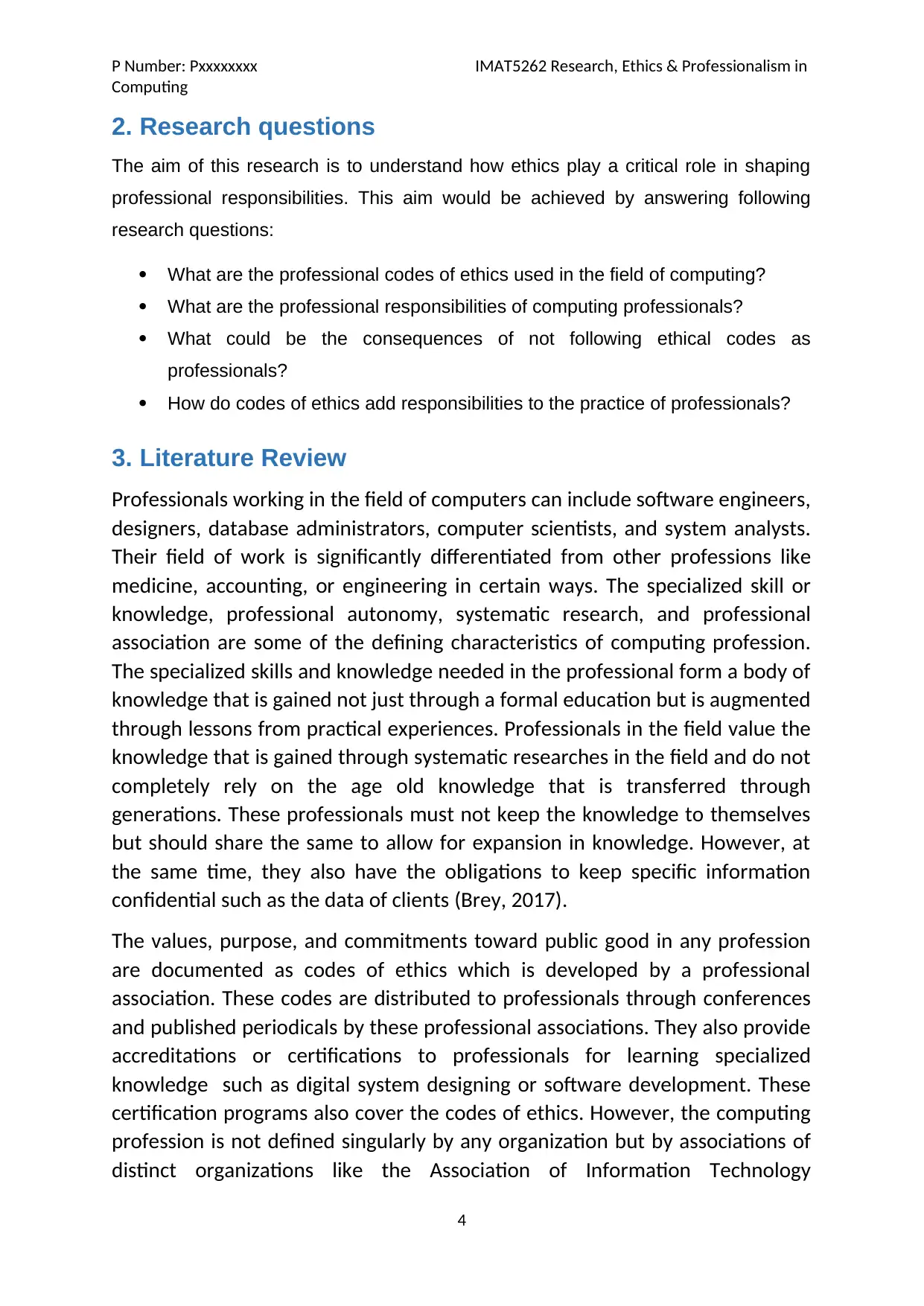
P Number: Pxxxxxxxx IMAT5262 Research, Ethics & Professionalism in
Computing
2. Research questions
The aim of this research is to understand how ethics play a critical role in shaping
professional responsibilities. This aim would be achieved by answering following
research questions:
What are the professional codes of ethics used in the field of computing?
What are the professional responsibilities of computing professionals?
What could be the consequences of not following ethical codes as
professionals?
How do codes of ethics add responsibilities to the practice of professionals?
3. Literature Review
Professionals working in the field of computers can include software engineers,
designers, database administrators, computer scientists, and system analysts.
Their field of work is significantly differentiated from other professions like
medicine, accounting, or engineering in certain ways. The specialized skill or
knowledge, professional autonomy, systematic research, and professional
association are some of the defining characteristics of computing profession.
The specialized skills and knowledge needed in the professional form a body of
knowledge that is gained not just through a formal education but is augmented
through lessons from practical experiences. Professionals in the field value the
knowledge that is gained through systematic researches in the field and do not
completely rely on the age old knowledge that is transferred through
generations. These professionals must not keep the knowledge to themselves
but should share the same to allow for expansion in knowledge. However, at
the same time, they also have the obligations to keep specific information
confidential such as the data of clients (Brey, 2017).
The values, purpose, and commitments toward public good in any profession
are documented as codes of ethics which is developed by a professional
association. These codes are distributed to professionals through conferences
and published periodicals by these professional associations. They also provide
accreditations or certifications to professionals for learning specialized
knowledge such as digital system designing or software development. These
certification programs also cover the codes of ethics. However, the computing
profession is not defined singularly by any organization but by associations of
distinct organizations like the Association of Information Technology
4
Computing
2. Research questions
The aim of this research is to understand how ethics play a critical role in shaping
professional responsibilities. This aim would be achieved by answering following
research questions:
What are the professional codes of ethics used in the field of computing?
What are the professional responsibilities of computing professionals?
What could be the consequences of not following ethical codes as
professionals?
How do codes of ethics add responsibilities to the practice of professionals?
3. Literature Review
Professionals working in the field of computers can include software engineers,
designers, database administrators, computer scientists, and system analysts.
Their field of work is significantly differentiated from other professions like
medicine, accounting, or engineering in certain ways. The specialized skill or
knowledge, professional autonomy, systematic research, and professional
association are some of the defining characteristics of computing profession.
The specialized skills and knowledge needed in the professional form a body of
knowledge that is gained not just through a formal education but is augmented
through lessons from practical experiences. Professionals in the field value the
knowledge that is gained through systematic researches in the field and do not
completely rely on the age old knowledge that is transferred through
generations. These professionals must not keep the knowledge to themselves
but should share the same to allow for expansion in knowledge. However, at
the same time, they also have the obligations to keep specific information
confidential such as the data of clients (Brey, 2017).
The values, purpose, and commitments toward public good in any profession
are documented as codes of ethics which is developed by a professional
association. These codes are distributed to professionals through conferences
and published periodicals by these professional associations. They also provide
accreditations or certifications to professionals for learning specialized
knowledge such as digital system designing or software development. These
certification programs also cover the codes of ethics. However, the computing
profession is not defined singularly by any organization but by associations of
distinct organizations like the Association of Information Technology
4
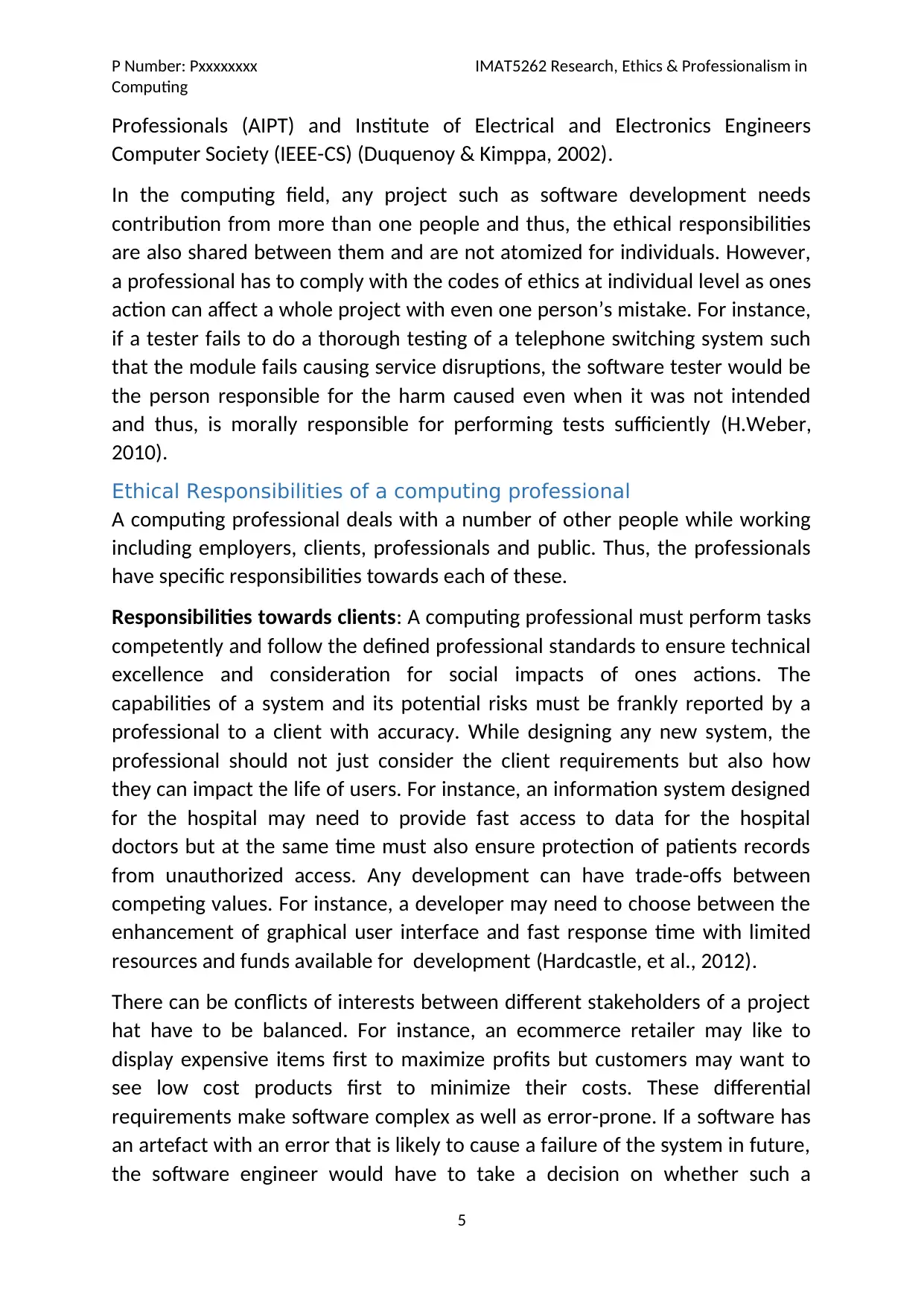
P Number: Pxxxxxxxx IMAT5262 Research, Ethics & Professionalism in
Computing
Professionals (AIPT) and Institute of Electrical and Electronics Engineers
Computer Society (IEEE-CS) (Duquenoy & Kimppa, 2002).
In the computing field, any project such as software development needs
contribution from more than one people and thus, the ethical responsibilities
are also shared between them and are not atomized for individuals. However,
a professional has to comply with the codes of ethics at individual level as ones
action can affect a whole project with even one person’s mistake. For instance,
if a tester fails to do a thorough testing of a telephone switching system such
that the module fails causing service disruptions, the software tester would be
the person responsible for the harm caused even when it was not intended
and thus, is morally responsible for performing tests sufficiently (H.Weber,
2010).
Ethical Responsibilities of a computing professional
A computing professional deals with a number of other people while working
including employers, clients, professionals and public. Thus, the professionals
have specific responsibilities towards each of these.
Responsibilities towards clients: A computing professional must perform tasks
competently and follow the defined professional standards to ensure technical
excellence and consideration for social impacts of ones actions. The
capabilities of a system and its potential risks must be frankly reported by a
professional to a client with accuracy. While designing any new system, the
professional should not just consider the client requirements but also how
they can impact the life of users. For instance, an information system designed
for the hospital may need to provide fast access to data for the hospital
doctors but at the same time must also ensure protection of patients records
from unauthorized access. Any development can have trade-offs between
competing values. For instance, a developer may need to choose between the
enhancement of graphical user interface and fast response time with limited
resources and funds available for development (Hardcastle, et al., 2012).
There can be conflicts of interests between different stakeholders of a project
hat have to be balanced. For instance, an ecommerce retailer may like to
display expensive items first to maximize profits but customers may want to
see low cost products first to minimize their costs. These differential
requirements make software complex as well as error-prone. If a software has
an artefact with an error that is likely to cause a failure of the system in future,
the software engineer would have to take a decision on whether such a
5
Computing
Professionals (AIPT) and Institute of Electrical and Electronics Engineers
Computer Society (IEEE-CS) (Duquenoy & Kimppa, 2002).
In the computing field, any project such as software development needs
contribution from more than one people and thus, the ethical responsibilities
are also shared between them and are not atomized for individuals. However,
a professional has to comply with the codes of ethics at individual level as ones
action can affect a whole project with even one person’s mistake. For instance,
if a tester fails to do a thorough testing of a telephone switching system such
that the module fails causing service disruptions, the software tester would be
the person responsible for the harm caused even when it was not intended
and thus, is morally responsible for performing tests sufficiently (H.Weber,
2010).
Ethical Responsibilities of a computing professional
A computing professional deals with a number of other people while working
including employers, clients, professionals and public. Thus, the professionals
have specific responsibilities towards each of these.
Responsibilities towards clients: A computing professional must perform tasks
competently and follow the defined professional standards to ensure technical
excellence and consideration for social impacts of ones actions. The
capabilities of a system and its potential risks must be frankly reported by a
professional to a client with accuracy. While designing any new system, the
professional should not just consider the client requirements but also how
they can impact the life of users. For instance, an information system designed
for the hospital may need to provide fast access to data for the hospital
doctors but at the same time must also ensure protection of patients records
from unauthorized access. Any development can have trade-offs between
competing values. For instance, a developer may need to choose between the
enhancement of graphical user interface and fast response time with limited
resources and funds available for development (Hardcastle, et al., 2012).
There can be conflicts of interests between different stakeholders of a project
hat have to be balanced. For instance, an ecommerce retailer may like to
display expensive items first to maximize profits but customers may want to
see low cost products first to minimize their costs. These differential
requirements make software complex as well as error-prone. If a software has
an artefact with an error that is likely to cause a failure of the system in future,
the software engineer would have to take a decision on whether such a
5
⊘ This is a preview!⊘
Do you want full access?
Subscribe today to unlock all pages.

Trusted by 1+ million students worldwide
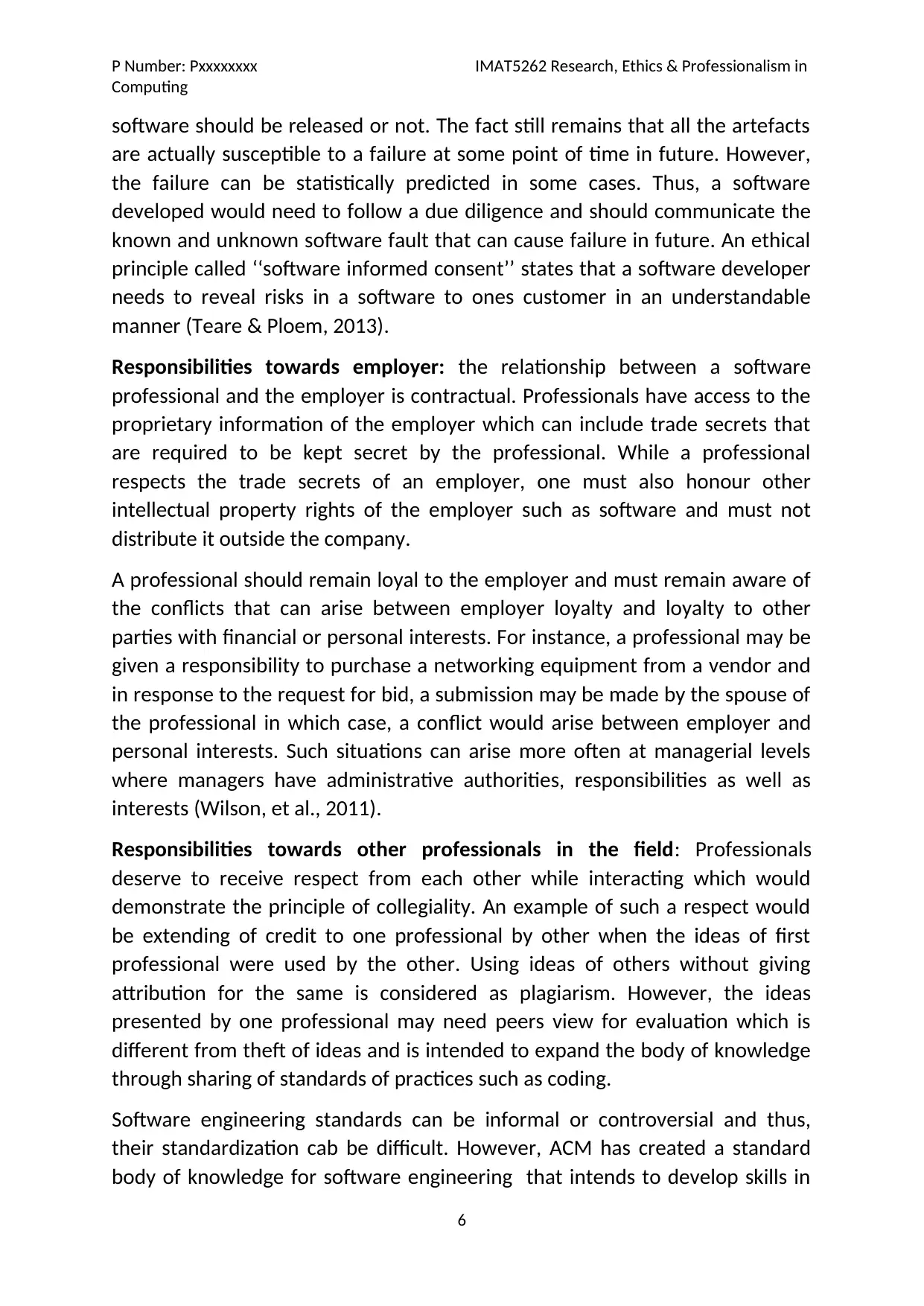
P Number: Pxxxxxxxx IMAT5262 Research, Ethics & Professionalism in
Computing
software should be released or not. The fact still remains that all the artefacts
are actually susceptible to a failure at some point of time in future. However,
the failure can be statistically predicted in some cases. Thus, a software
developed would need to follow a due diligence and should communicate the
known and unknown software fault that can cause failure in future. An ethical
principle called ‘‘software informed consent’’ states that a software developer
needs to reveal risks in a software to ones customer in an understandable
manner (Teare & Ploem, 2013).
Responsibilities towards employer: the relationship between a software
professional and the employer is contractual. Professionals have access to the
proprietary information of the employer which can include trade secrets that
are required to be kept secret by the professional. While a professional
respects the trade secrets of an employer, one must also honour other
intellectual property rights of the employer such as software and must not
distribute it outside the company.
A professional should remain loyal to the employer and must remain aware of
the conflicts that can arise between employer loyalty and loyalty to other
parties with financial or personal interests. For instance, a professional may be
given a responsibility to purchase a networking equipment from a vendor and
in response to the request for bid, a submission may be made by the spouse of
the professional in which case, a conflict would arise between employer and
personal interests. Such situations can arise more often at managerial levels
where managers have administrative authorities, responsibilities as well as
interests (Wilson, et al., 2011).
Responsibilities towards other professionals in the field: Professionals
deserve to receive respect from each other while interacting which would
demonstrate the principle of collegiality. An example of such a respect would
be extending of credit to one professional by other when the ideas of first
professional were used by the other. Using ideas of others without giving
attribution for the same is considered as plagiarism. However, the ideas
presented by one professional may need peers view for evaluation which is
different from theft of ideas and is intended to expand the body of knowledge
through sharing of standards of practices such as coding.
Software engineering standards can be informal or controversial and thus,
their standardization cab be difficult. However, ACM has created a standard
body of knowledge for software engineering that intends to develop skills in
6
Computing
software should be released or not. The fact still remains that all the artefacts
are actually susceptible to a failure at some point of time in future. However,
the failure can be statistically predicted in some cases. Thus, a software
developed would need to follow a due diligence and should communicate the
known and unknown software fault that can cause failure in future. An ethical
principle called ‘‘software informed consent’’ states that a software developer
needs to reveal risks in a software to ones customer in an understandable
manner (Teare & Ploem, 2013).
Responsibilities towards employer: the relationship between a software
professional and the employer is contractual. Professionals have access to the
proprietary information of the employer which can include trade secrets that
are required to be kept secret by the professional. While a professional
respects the trade secrets of an employer, one must also honour other
intellectual property rights of the employer such as software and must not
distribute it outside the company.
A professional should remain loyal to the employer and must remain aware of
the conflicts that can arise between employer loyalty and loyalty to other
parties with financial or personal interests. For instance, a professional may be
given a responsibility to purchase a networking equipment from a vendor and
in response to the request for bid, a submission may be made by the spouse of
the professional in which case, a conflict would arise between employer and
personal interests. Such situations can arise more often at managerial levels
where managers have administrative authorities, responsibilities as well as
interests (Wilson, et al., 2011).
Responsibilities towards other professionals in the field: Professionals
deserve to receive respect from each other while interacting which would
demonstrate the principle of collegiality. An example of such a respect would
be extending of credit to one professional by other when the ideas of first
professional were used by the other. Using ideas of others without giving
attribution for the same is considered as plagiarism. However, the ideas
presented by one professional may need peers view for evaluation which is
different from theft of ideas and is intended to expand the body of knowledge
through sharing of standards of practices such as coding.
Software engineering standards can be informal or controversial and thus,
their standardization cab be difficult. However, ACM has created a standard
body of knowledge for software engineering that intends to develop skills in
6
Paraphrase This Document
Need a fresh take? Get an instant paraphrase of this document with our AI Paraphraser
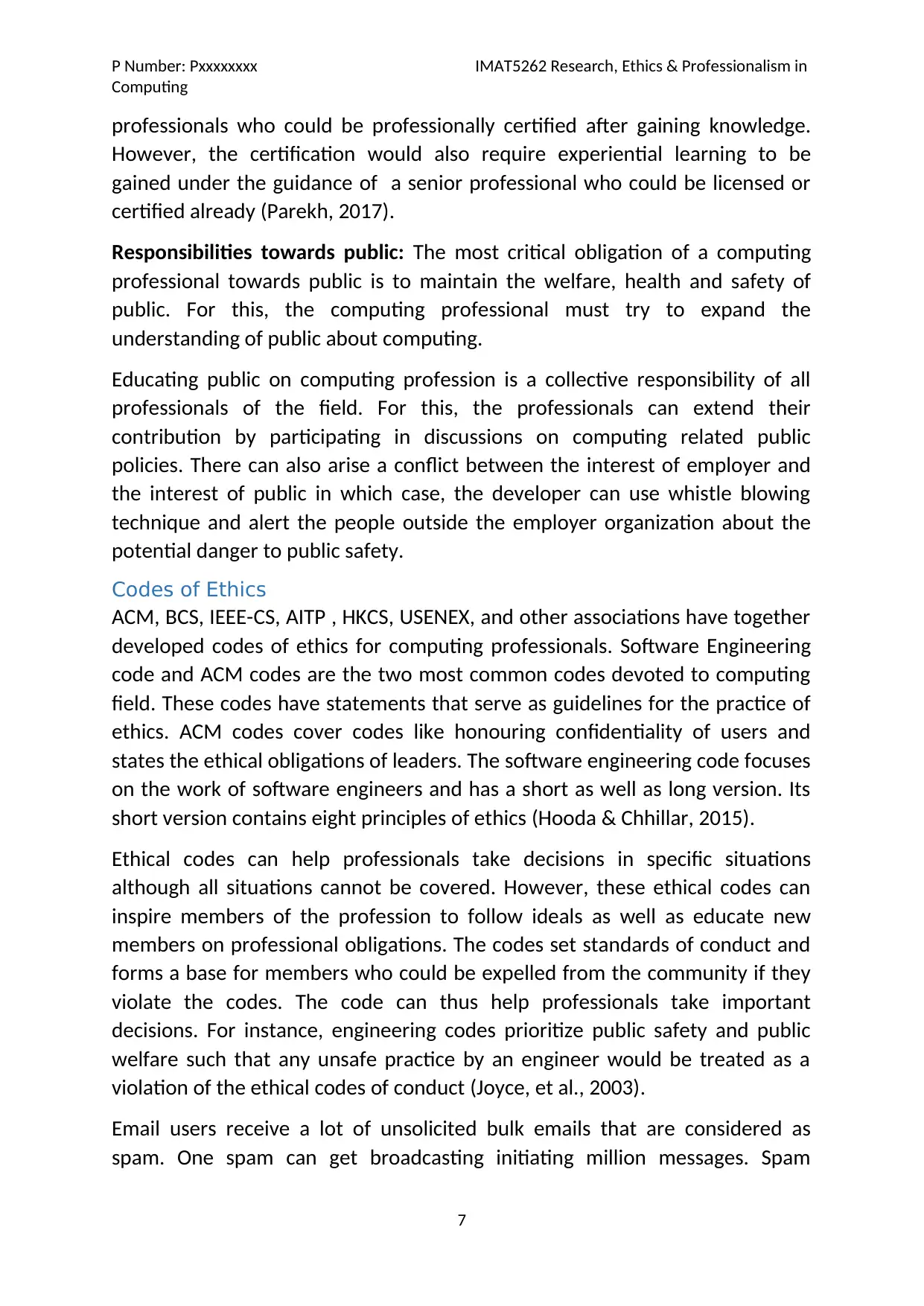
P Number: Pxxxxxxxx IMAT5262 Research, Ethics & Professionalism in
Computing
professionals who could be professionally certified after gaining knowledge.
However, the certification would also require experiential learning to be
gained under the guidance of a senior professional who could be licensed or
certified already (Parekh, 2017).
Responsibilities towards public: The most critical obligation of a computing
professional towards public is to maintain the welfare, health and safety of
public. For this, the computing professional must try to expand the
understanding of public about computing.
Educating public on computing profession is a collective responsibility of all
professionals of the field. For this, the professionals can extend their
contribution by participating in discussions on computing related public
policies. There can also arise a conflict between the interest of employer and
the interest of public in which case, the developer can use whistle blowing
technique and alert the people outside the employer organization about the
potential danger to public safety.
Codes of Ethics
ACM, BCS, IEEE-CS, AITP , HKCS, USENEX, and other associations have together
developed codes of ethics for computing professionals. Software Engineering
code and ACM codes are the two most common codes devoted to computing
field. These codes have statements that serve as guidelines for the practice of
ethics. ACM codes cover codes like honouring confidentiality of users and
states the ethical obligations of leaders. The software engineering code focuses
on the work of software engineers and has a short as well as long version. Its
short version contains eight principles of ethics (Hooda & Chhillar, 2015).
Ethical codes can help professionals take decisions in specific situations
although all situations cannot be covered. However, these ethical codes can
inspire members of the profession to follow ideals as well as educate new
members on professional obligations. The codes set standards of conduct and
forms a base for members who could be expelled from the community if they
violate the codes. The code can thus help professionals take important
decisions. For instance, engineering codes prioritize public safety and public
welfare such that any unsafe practice by an engineer would be treated as a
violation of the ethical codes of conduct (Joyce, et al., 2003).
Email users receive a lot of unsolicited bulk emails that are considered as
spam. One spam can get broadcasting initiating million messages. Spam
7
Computing
professionals who could be professionally certified after gaining knowledge.
However, the certification would also require experiential learning to be
gained under the guidance of a senior professional who could be licensed or
certified already (Parekh, 2017).
Responsibilities towards public: The most critical obligation of a computing
professional towards public is to maintain the welfare, health and safety of
public. For this, the computing professional must try to expand the
understanding of public about computing.
Educating public on computing profession is a collective responsibility of all
professionals of the field. For this, the professionals can extend their
contribution by participating in discussions on computing related public
policies. There can also arise a conflict between the interest of employer and
the interest of public in which case, the developer can use whistle blowing
technique and alert the people outside the employer organization about the
potential danger to public safety.
Codes of Ethics
ACM, BCS, IEEE-CS, AITP , HKCS, USENEX, and other associations have together
developed codes of ethics for computing professionals. Software Engineering
code and ACM codes are the two most common codes devoted to computing
field. These codes have statements that serve as guidelines for the practice of
ethics. ACM codes cover codes like honouring confidentiality of users and
states the ethical obligations of leaders. The software engineering code focuses
on the work of software engineers and has a short as well as long version. Its
short version contains eight principles of ethics (Hooda & Chhillar, 2015).
Ethical codes can help professionals take decisions in specific situations
although all situations cannot be covered. However, these ethical codes can
inspire members of the profession to follow ideals as well as educate new
members on professional obligations. The codes set standards of conduct and
forms a base for members who could be expelled from the community if they
violate the codes. The code can thus help professionals take important
decisions. For instance, engineering codes prioritize public safety and public
welfare such that any unsafe practice by an engineer would be treated as a
violation of the ethical codes of conduct (Joyce, et al., 2003).
Email users receive a lot of unsolicited bulk emails that are considered as
spam. One spam can get broadcasting initiating million messages. Spam
7
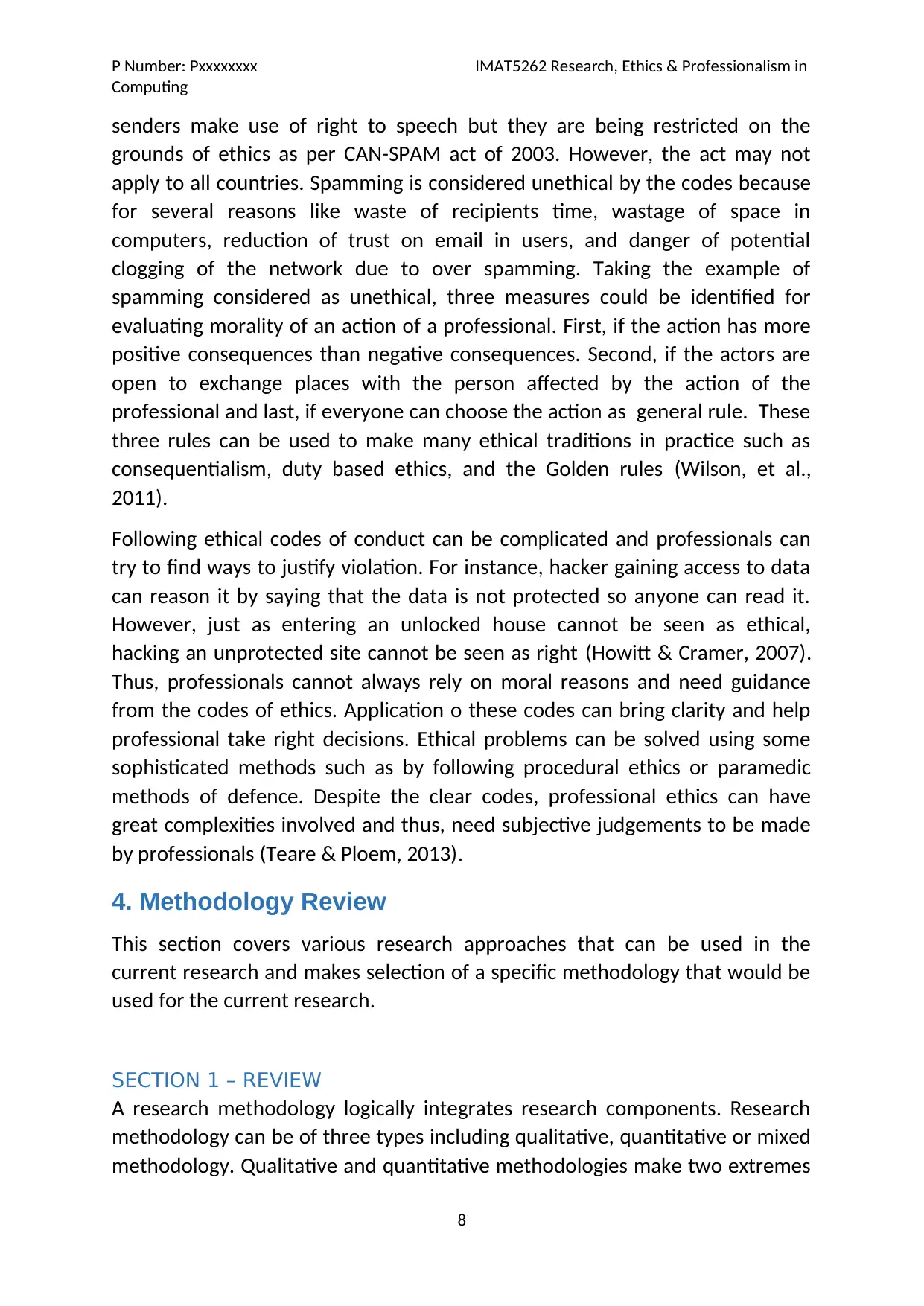
P Number: Pxxxxxxxx IMAT5262 Research, Ethics & Professionalism in
Computing
senders make use of right to speech but they are being restricted on the
grounds of ethics as per CAN-SPAM act of 2003. However, the act may not
apply to all countries. Spamming is considered unethical by the codes because
for several reasons like waste of recipients time, wastage of space in
computers, reduction of trust on email in users, and danger of potential
clogging of the network due to over spamming. Taking the example of
spamming considered as unethical, three measures could be identified for
evaluating morality of an action of a professional. First, if the action has more
positive consequences than negative consequences. Second, if the actors are
open to exchange places with the person affected by the action of the
professional and last, if everyone can choose the action as general rule. These
three rules can be used to make many ethical traditions in practice such as
consequentialism, duty based ethics, and the Golden rules (Wilson, et al.,
2011).
Following ethical codes of conduct can be complicated and professionals can
try to find ways to justify violation. For instance, hacker gaining access to data
can reason it by saying that the data is not protected so anyone can read it.
However, just as entering an unlocked house cannot be seen as ethical,
hacking an unprotected site cannot be seen as right (Howitt & Cramer, 2007).
Thus, professionals cannot always rely on moral reasons and need guidance
from the codes of ethics. Application o these codes can bring clarity and help
professional take right decisions. Ethical problems can be solved using some
sophisticated methods such as by following procedural ethics or paramedic
methods of defence. Despite the clear codes, professional ethics can have
great complexities involved and thus, need subjective judgements to be made
by professionals (Teare & Ploem, 2013).
4. Methodology Review
This section covers various research approaches that can be used in the
current research and makes selection of a specific methodology that would be
used for the current research.
SECTION 1 – REVIEW
A research methodology logically integrates research components. Research
methodology can be of three types including qualitative, quantitative or mixed
methodology. Qualitative and quantitative methodologies make two extremes
8
Computing
senders make use of right to speech but they are being restricted on the
grounds of ethics as per CAN-SPAM act of 2003. However, the act may not
apply to all countries. Spamming is considered unethical by the codes because
for several reasons like waste of recipients time, wastage of space in
computers, reduction of trust on email in users, and danger of potential
clogging of the network due to over spamming. Taking the example of
spamming considered as unethical, three measures could be identified for
evaluating morality of an action of a professional. First, if the action has more
positive consequences than negative consequences. Second, if the actors are
open to exchange places with the person affected by the action of the
professional and last, if everyone can choose the action as general rule. These
three rules can be used to make many ethical traditions in practice such as
consequentialism, duty based ethics, and the Golden rules (Wilson, et al.,
2011).
Following ethical codes of conduct can be complicated and professionals can
try to find ways to justify violation. For instance, hacker gaining access to data
can reason it by saying that the data is not protected so anyone can read it.
However, just as entering an unlocked house cannot be seen as ethical,
hacking an unprotected site cannot be seen as right (Howitt & Cramer, 2007).
Thus, professionals cannot always rely on moral reasons and need guidance
from the codes of ethics. Application o these codes can bring clarity and help
professional take right decisions. Ethical problems can be solved using some
sophisticated methods such as by following procedural ethics or paramedic
methods of defence. Despite the clear codes, professional ethics can have
great complexities involved and thus, need subjective judgements to be made
by professionals (Teare & Ploem, 2013).
4. Methodology Review
This section covers various research approaches that can be used in the
current research and makes selection of a specific methodology that would be
used for the current research.
SECTION 1 – REVIEW
A research methodology logically integrates research components. Research
methodology can be of three types including qualitative, quantitative or mixed
methodology. Qualitative and quantitative methodologies make two extremes
8
⊘ This is a preview!⊘
Do you want full access?
Subscribe today to unlock all pages.

Trusted by 1+ million students worldwide
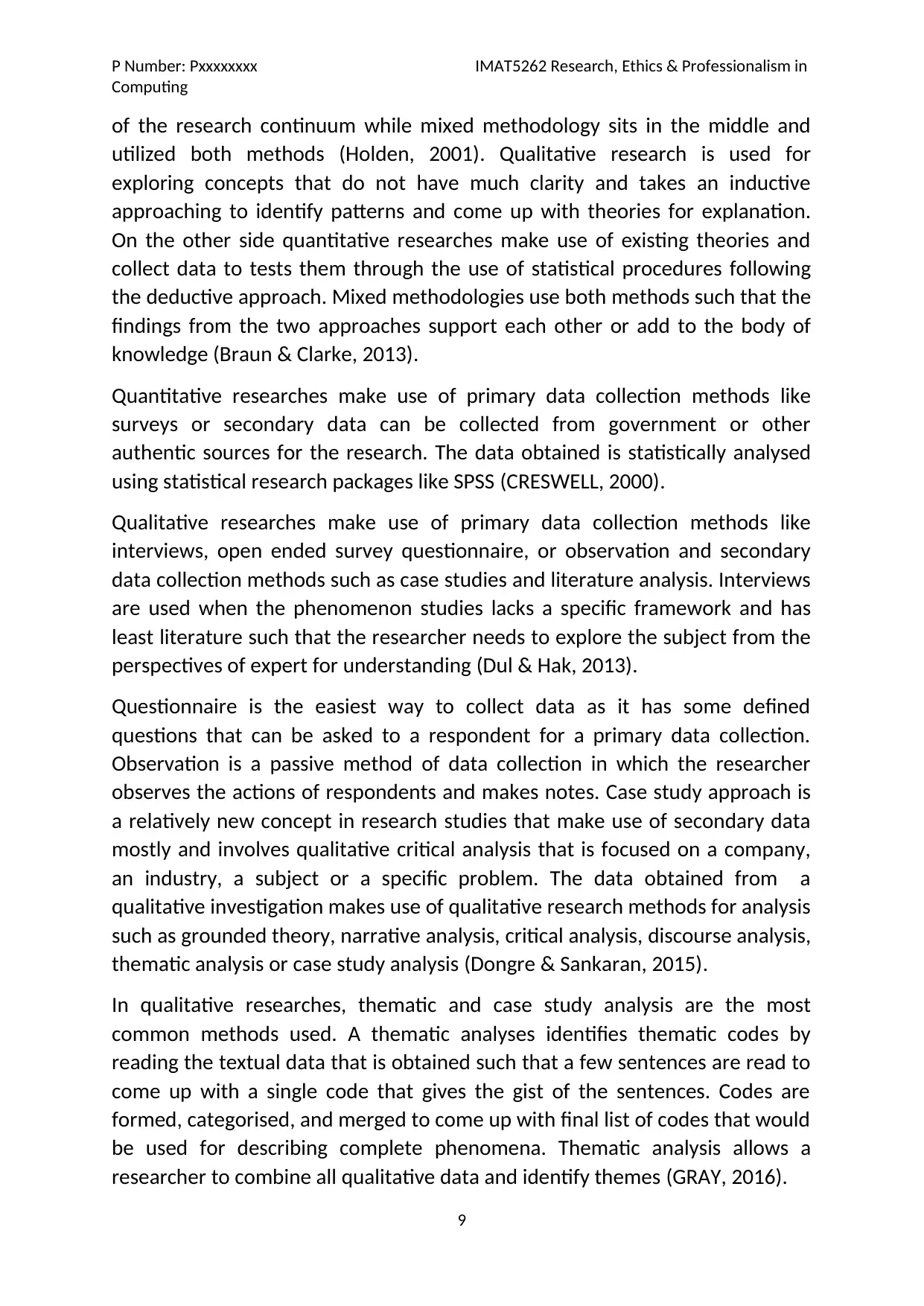
P Number: Pxxxxxxxx IMAT5262 Research, Ethics & Professionalism in
Computing
of the research continuum while mixed methodology sits in the middle and
utilized both methods (Holden, 2001). Qualitative research is used for
exploring concepts that do not have much clarity and takes an inductive
approaching to identify patterns and come up with theories for explanation.
On the other side quantitative researches make use of existing theories and
collect data to tests them through the use of statistical procedures following
the deductive approach. Mixed methodologies use both methods such that the
findings from the two approaches support each other or add to the body of
knowledge (Braun & Clarke, 2013).
Quantitative researches make use of primary data collection methods like
surveys or secondary data can be collected from government or other
authentic sources for the research. The data obtained is statistically analysed
using statistical research packages like SPSS (CRESWELL, 2000).
Qualitative researches make use of primary data collection methods like
interviews, open ended survey questionnaire, or observation and secondary
data collection methods such as case studies and literature analysis. Interviews
are used when the phenomenon studies lacks a specific framework and has
least literature such that the researcher needs to explore the subject from the
perspectives of expert for understanding (Dul & Hak, 2013).
Questionnaire is the easiest way to collect data as it has some defined
questions that can be asked to a respondent for a primary data collection.
Observation is a passive method of data collection in which the researcher
observes the actions of respondents and makes notes. Case study approach is
a relatively new concept in research studies that make use of secondary data
mostly and involves qualitative critical analysis that is focused on a company,
an industry, a subject or a specific problem. The data obtained from a
qualitative investigation makes use of qualitative research methods for analysis
such as grounded theory, narrative analysis, critical analysis, discourse analysis,
thematic analysis or case study analysis (Dongre & Sankaran, 2015).
In qualitative researches, thematic and case study analysis are the most
common methods used. A thematic analyses identifies thematic codes by
reading the textual data that is obtained such that a few sentences are read to
come up with a single code that gives the gist of the sentences. Codes are
formed, categorised, and merged to come up with final list of codes that would
be used for describing complete phenomena. Thematic analysis allows a
researcher to combine all qualitative data and identify themes (GRAY, 2016).
9
Computing
of the research continuum while mixed methodology sits in the middle and
utilized both methods (Holden, 2001). Qualitative research is used for
exploring concepts that do not have much clarity and takes an inductive
approaching to identify patterns and come up with theories for explanation.
On the other side quantitative researches make use of existing theories and
collect data to tests them through the use of statistical procedures following
the deductive approach. Mixed methodologies use both methods such that the
findings from the two approaches support each other or add to the body of
knowledge (Braun & Clarke, 2013).
Quantitative researches make use of primary data collection methods like
surveys or secondary data can be collected from government or other
authentic sources for the research. The data obtained is statistically analysed
using statistical research packages like SPSS (CRESWELL, 2000).
Qualitative researches make use of primary data collection methods like
interviews, open ended survey questionnaire, or observation and secondary
data collection methods such as case studies and literature analysis. Interviews
are used when the phenomenon studies lacks a specific framework and has
least literature such that the researcher needs to explore the subject from the
perspectives of expert for understanding (Dul & Hak, 2013).
Questionnaire is the easiest way to collect data as it has some defined
questions that can be asked to a respondent for a primary data collection.
Observation is a passive method of data collection in which the researcher
observes the actions of respondents and makes notes. Case study approach is
a relatively new concept in research studies that make use of secondary data
mostly and involves qualitative critical analysis that is focused on a company,
an industry, a subject or a specific problem. The data obtained from a
qualitative investigation makes use of qualitative research methods for analysis
such as grounded theory, narrative analysis, critical analysis, discourse analysis,
thematic analysis or case study analysis (Dongre & Sankaran, 2015).
In qualitative researches, thematic and case study analysis are the most
common methods used. A thematic analyses identifies thematic codes by
reading the textual data that is obtained such that a few sentences are read to
come up with a single code that gives the gist of the sentences. Codes are
formed, categorised, and merged to come up with final list of codes that would
be used for describing complete phenomena. Thematic analysis allows a
researcher to combine all qualitative data and identify themes (GRAY, 2016).
9
Paraphrase This Document
Need a fresh take? Get an instant paraphrase of this document with our AI Paraphraser
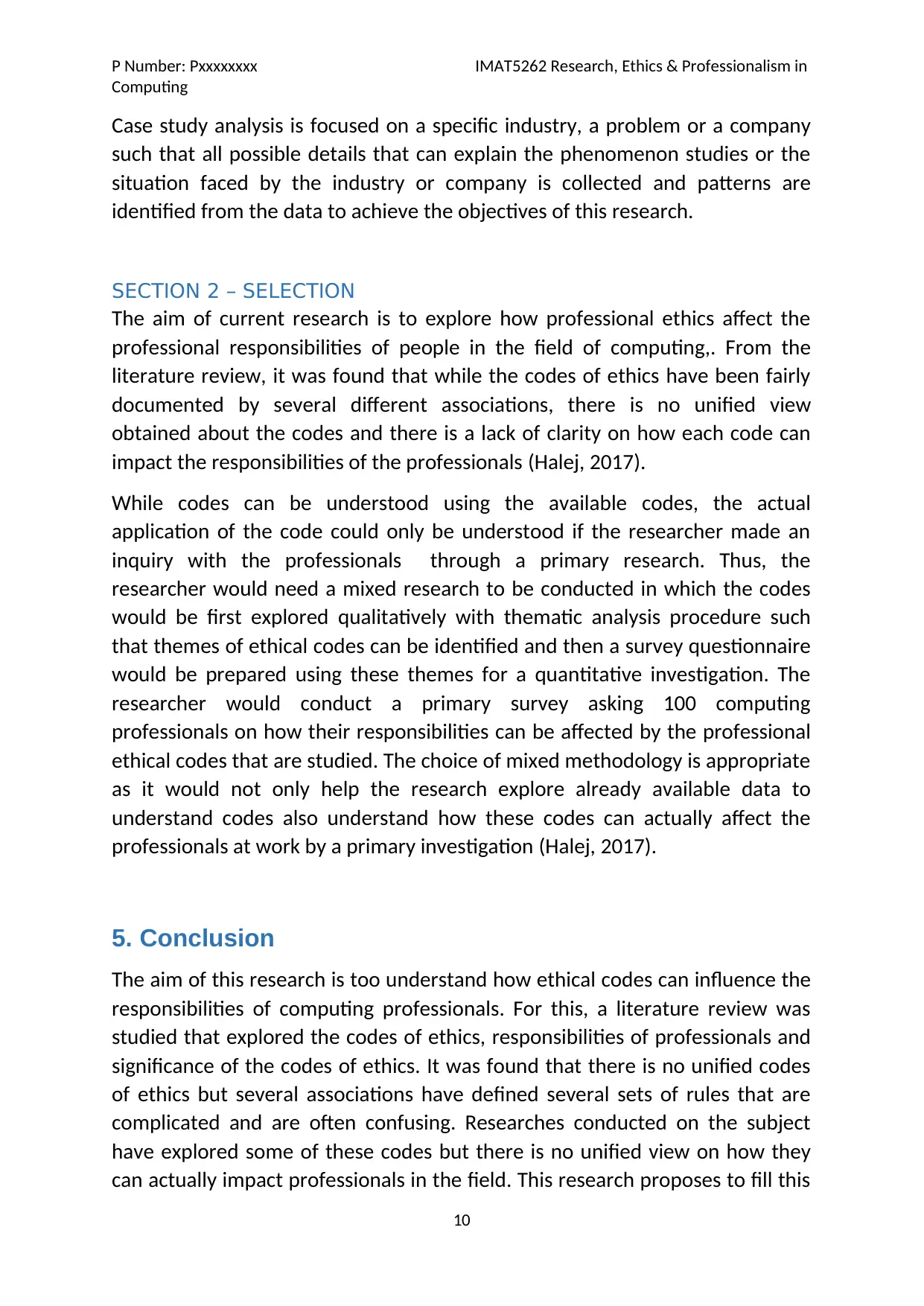
P Number: Pxxxxxxxx IMAT5262 Research, Ethics & Professionalism in
Computing
Case study analysis is focused on a specific industry, a problem or a company
such that all possible details that can explain the phenomenon studies or the
situation faced by the industry or company is collected and patterns are
identified from the data to achieve the objectives of this research.
SECTION 2 – SELECTION
The aim of current research is to explore how professional ethics affect the
professional responsibilities of people in the field of computing,. From the
literature review, it was found that while the codes of ethics have been fairly
documented by several different associations, there is no unified view
obtained about the codes and there is a lack of clarity on how each code can
impact the responsibilities of the professionals (Halej, 2017).
While codes can be understood using the available codes, the actual
application of the code could only be understood if the researcher made an
inquiry with the professionals through a primary research. Thus, the
researcher would need a mixed research to be conducted in which the codes
would be first explored qualitatively with thematic analysis procedure such
that themes of ethical codes can be identified and then a survey questionnaire
would be prepared using these themes for a quantitative investigation. The
researcher would conduct a primary survey asking 100 computing
professionals on how their responsibilities can be affected by the professional
ethical codes that are studied. The choice of mixed methodology is appropriate
as it would not only help the research explore already available data to
understand codes also understand how these codes can actually affect the
professionals at work by a primary investigation (Halej, 2017).
5. Conclusion
The aim of this research is too understand how ethical codes can influence the
responsibilities of computing professionals. For this, a literature review was
studied that explored the codes of ethics, responsibilities of professionals and
significance of the codes of ethics. It was found that there is no unified codes
of ethics but several associations have defined several sets of rules that are
complicated and are often confusing. Researches conducted on the subject
have explored some of these codes but there is no unified view on how they
can actually impact professionals in the field. This research proposes to fill this
10
Computing
Case study analysis is focused on a specific industry, a problem or a company
such that all possible details that can explain the phenomenon studies or the
situation faced by the industry or company is collected and patterns are
identified from the data to achieve the objectives of this research.
SECTION 2 – SELECTION
The aim of current research is to explore how professional ethics affect the
professional responsibilities of people in the field of computing,. From the
literature review, it was found that while the codes of ethics have been fairly
documented by several different associations, there is no unified view
obtained about the codes and there is a lack of clarity on how each code can
impact the responsibilities of the professionals (Halej, 2017).
While codes can be understood using the available codes, the actual
application of the code could only be understood if the researcher made an
inquiry with the professionals through a primary research. Thus, the
researcher would need a mixed research to be conducted in which the codes
would be first explored qualitatively with thematic analysis procedure such
that themes of ethical codes can be identified and then a survey questionnaire
would be prepared using these themes for a quantitative investigation. The
researcher would conduct a primary survey asking 100 computing
professionals on how their responsibilities can be affected by the professional
ethical codes that are studied. The choice of mixed methodology is appropriate
as it would not only help the research explore already available data to
understand codes also understand how these codes can actually affect the
professionals at work by a primary investigation (Halej, 2017).
5. Conclusion
The aim of this research is too understand how ethical codes can influence the
responsibilities of computing professionals. For this, a literature review was
studied that explored the codes of ethics, responsibilities of professionals and
significance of the codes of ethics. It was found that there is no unified codes
of ethics but several associations have defined several sets of rules that are
complicated and are often confusing. Researches conducted on the subject
have explored some of these codes but there is no unified view on how they
can actually impact professionals in the field. This research proposes to fill this
10
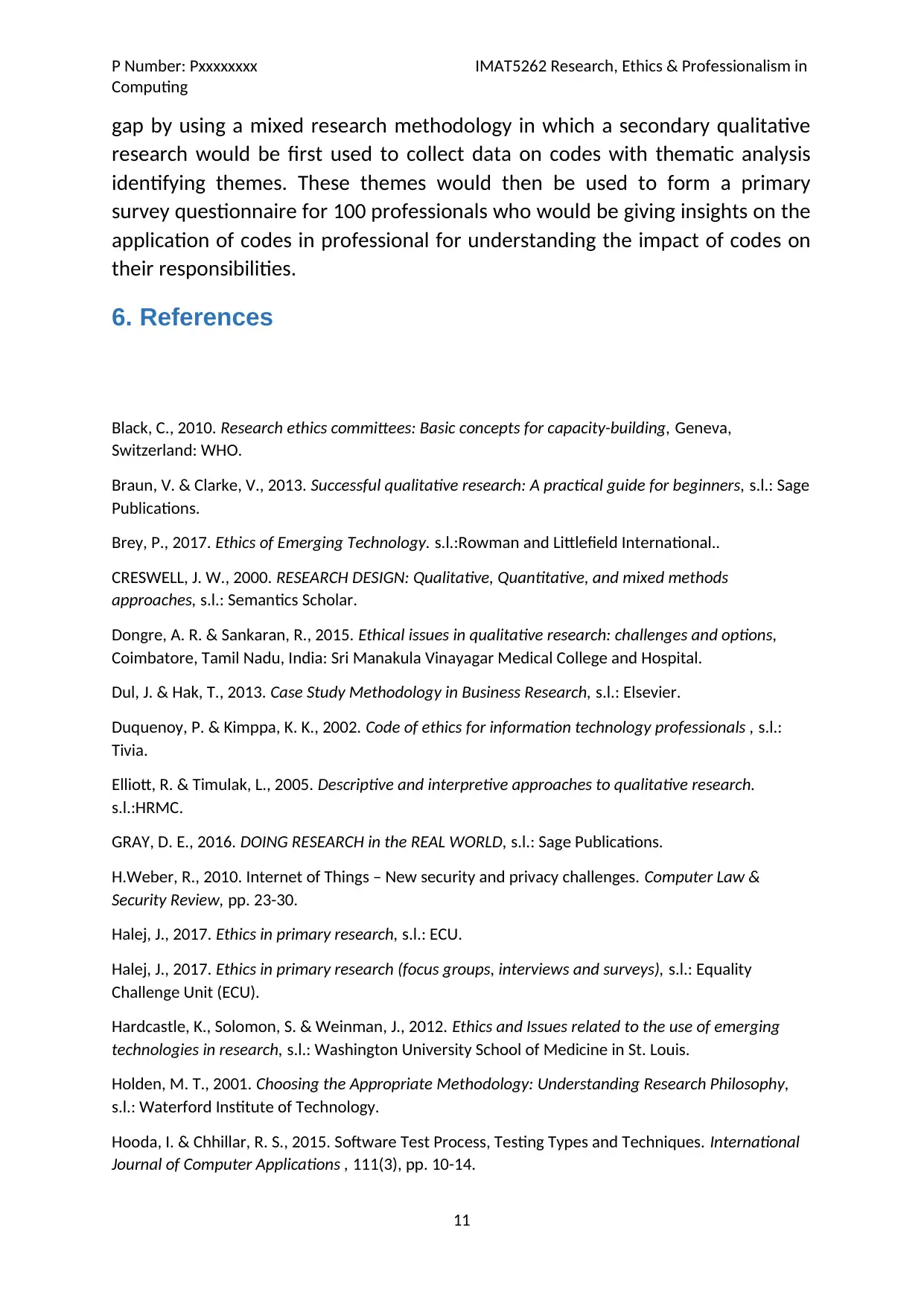
P Number: Pxxxxxxxx IMAT5262 Research, Ethics & Professionalism in
Computing
gap by using a mixed research methodology in which a secondary qualitative
research would be first used to collect data on codes with thematic analysis
identifying themes. These themes would then be used to form a primary
survey questionnaire for 100 professionals who would be giving insights on the
application of codes in professional for understanding the impact of codes on
their responsibilities.
6. References
Black, C., 2010. Research ethics committees: Basic concepts for capacity-building, Geneva,
Switzerland: WHO.
Braun, V. & Clarke, V., 2013. Successful qualitative research: A practical guide for beginners, s.l.: Sage
Publications.
Brey, P., 2017. Ethics of Emerging Technology. s.l.:Rowman and Littlefield International..
CRESWELL, J. W., 2000. RESEARCH DESIGN: Qualitative, Quantitative, and mixed methods
approaches, s.l.: Semantics Scholar.
Dongre, A. R. & Sankaran, R., 2015. Ethical issues in qualitative research: challenges and options,
Coimbatore, Tamil Nadu, India: Sri Manakula Vinayagar Medical College and Hospital.
Dul, J. & Hak, T., 2013. Case Study Methodology in Business Research, s.l.: Elsevier.
Duquenoy, P. & Kimppa, K. K., 2002. Code of ethics for information technology professionals , s.l.:
Tivia.
Elliott, R. & Timulak, L., 2005. Descriptive and interpretive approaches to qualitative research.
s.l.:HRMC.
GRAY, D. E., 2016. DOING RESEARCH in the REAL WORLD, s.l.: Sage Publications.
H.Weber, R., 2010. Internet of Things – New security and privacy challenges. Computer Law &
Security Review, pp. 23-30.
Halej, J., 2017. Ethics in primary research, s.l.: ECU.
Halej, J., 2017. Ethics in primary research (focus groups, interviews and surveys), s.l.: Equality
Challenge Unit (ECU).
Hardcastle, K., Solomon, S. & Weinman, J., 2012. Ethics and Issues related to the use of emerging
technologies in research, s.l.: Washington University School of Medicine in St. Louis.
Holden, M. T., 2001. Choosing the Appropriate Methodology: Understanding Research Philosophy,
s.l.: Waterford Institute of Technology.
Hooda, I. & Chhillar, R. S., 2015. Software Test Process, Testing Types and Techniques. International
Journal of Computer Applications , 111(3), pp. 10-14.
11
Computing
gap by using a mixed research methodology in which a secondary qualitative
research would be first used to collect data on codes with thematic analysis
identifying themes. These themes would then be used to form a primary
survey questionnaire for 100 professionals who would be giving insights on the
application of codes in professional for understanding the impact of codes on
their responsibilities.
6. References
Black, C., 2010. Research ethics committees: Basic concepts for capacity-building, Geneva,
Switzerland: WHO.
Braun, V. & Clarke, V., 2013. Successful qualitative research: A practical guide for beginners, s.l.: Sage
Publications.
Brey, P., 2017. Ethics of Emerging Technology. s.l.:Rowman and Littlefield International..
CRESWELL, J. W., 2000. RESEARCH DESIGN: Qualitative, Quantitative, and mixed methods
approaches, s.l.: Semantics Scholar.
Dongre, A. R. & Sankaran, R., 2015. Ethical issues in qualitative research: challenges and options,
Coimbatore, Tamil Nadu, India: Sri Manakula Vinayagar Medical College and Hospital.
Dul, J. & Hak, T., 2013. Case Study Methodology in Business Research, s.l.: Elsevier.
Duquenoy, P. & Kimppa, K. K., 2002. Code of ethics for information technology professionals , s.l.:
Tivia.
Elliott, R. & Timulak, L., 2005. Descriptive and interpretive approaches to qualitative research.
s.l.:HRMC.
GRAY, D. E., 2016. DOING RESEARCH in the REAL WORLD, s.l.: Sage Publications.
H.Weber, R., 2010. Internet of Things – New security and privacy challenges. Computer Law &
Security Review, pp. 23-30.
Halej, J., 2017. Ethics in primary research, s.l.: ECU.
Halej, J., 2017. Ethics in primary research (focus groups, interviews and surveys), s.l.: Equality
Challenge Unit (ECU).
Hardcastle, K., Solomon, S. & Weinman, J., 2012. Ethics and Issues related to the use of emerging
technologies in research, s.l.: Washington University School of Medicine in St. Louis.
Holden, M. T., 2001. Choosing the Appropriate Methodology: Understanding Research Philosophy,
s.l.: Waterford Institute of Technology.
Hooda, I. & Chhillar, R. S., 2015. Software Test Process, Testing Types and Techniques. International
Journal of Computer Applications , 111(3), pp. 10-14.
11
⊘ This is a preview!⊘
Do you want full access?
Subscribe today to unlock all pages.

Trusted by 1+ million students worldwide
1 out of 25
Related Documents
Your All-in-One AI-Powered Toolkit for Academic Success.
+13062052269
info@desklib.com
Available 24*7 on WhatsApp / Email
![[object Object]](/_next/static/media/star-bottom.7253800d.svg)
Unlock your academic potential
Copyright © 2020–2025 A2Z Services. All Rights Reserved. Developed and managed by ZUCOL.





